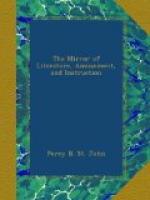[5] Glamorgan, Carmarthen,
Pembroke, Cardigan, Flint,
Carnarvon, Anglesea and Merioneth.
[6] Radnor, Brecknock, Montgomery,
and Denbigh, 27 Henry 8 c.
26.
[7] 34 and 35 Henry 8. c. 26. s. 50.
[8] 34 and 35 Henry 8. c. 13.—“That the said county have hitherto been excluded from the high court of parliament, to have any knights and burgesses within the said court, by reason whereof the inhabitants have sustained manifold damages in their lands, goods, and bodies, as well as in the good governance of the commonwealth of their said country; and for as much as they have been bound by the acts of the said court, and yet have had no knights and burgesses therein, for lack whereof they have been often touched and grieved by the acts of the said parliament, prejudicial to the commonwealth, quietness, rest, and peace of your highness’s bounden subjects, inhabiting within the said county,” &c.
* * * * *
THE TOPOGRAPHER.
TRAVELLING NOTES IN SOUTH WALES.
(Continued from page 312.)
The grounds of Penrice Castle, which stretch to the sea-shore, and on which art has embellished scenery possessing capabilities of a high order—are exceedingly picturesque and extensive. Penrice bears marks of having been a Roman station. Henry de Newburgh, Earl of Warwick, here defeated the Welsh prince, Rhys, which decided the fate of Gower. He was beheaded after the battle, whence the Welsh name, Pen-Rhys. On the field of battle the victor erected Penrice Castle, which is now certainly a striking ruin. On the coast near Penrice is the village and ruins of the Castle of Oxwich, now a barn—sic transit!




